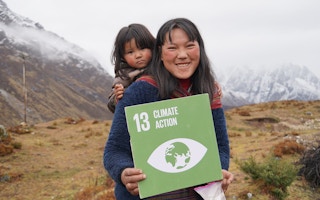Scientists have for years backed a goal to cap global warming at 1.5 degrees Celsius, to avoid the most dangerous effects for the planet. But a new analysis says the limit to prevent significant harm to people is just 1°C.
The warning - issued this week in research published in the journal Nature - comes late, given that the Earth has already heated up by about 1.2C since preindustrial times.
The World Meteorological Organization has said global average temperatures are more likely than not to breach 1.5°C - the most ambitious goal of the 2015 Paris Agreement to tackle climate change - in the next five years, on a temporary basis.
Given this prospect, leading climate scientist Johan Rockström, who co-authored the new study, said in an interview that it is valuable for policymakers and the public to know that the planet is already in highly risky territory.
“If we really care about people … we must understand that there is so much scientific evidence today that the safe and just landing zone is actually already surpassed,” he said.
Research led by the Earth Commission, a group of scientists working on sustainability, had earlier found that surpassing 1.5°C of warming risks triggering tipping points for irreversible changes in earth systems such as ice sheets and coral reefs.
“
If we can keep the planet in a stable state - if we can keep nature in a healthy state, that has the greatest potential of also providing human justice - and to me, that’s reassuring.
Johan Rockström, director, Potsdam Institute for Climate Impact Research
In the new study, they added a “justice” element to work out what level of warming brings severe and widespread impacts for humans such as death, displacement and chronic disease, as well as loss of incomes, food and water.
“We find that already 1°C equals what we define as significant harm”, with millions of people, communities, countries and regions affected permanently, said Rockström, the director of the Potsdam Institute for Climate Impact Research.
“That means that 1°C becomes the just maximum level of global warming,” he added.
That level was reached in 2015 - and with warming now likely to pass 1.5°C and head towards the less ambitious Paris pact limit of “well below 2C” - Rockström said he was nervous the debate may switch to settling for 2C and delaying the current 2050 deadline to cut planet-heating emissions to net zero.
“That is a more likely outcome than tightening up climate policy today, so science that proves that keeping us on this tightrope towards fast decarbonisation is really, really essential,” he added, emphasising the importance of planting the 1.5°C flag firmly “in the ground”.
In addition, Rockström said the finding that 1°C of warming has provoked severe human consequences and costs adds to the urgency of tackling “loss and damage” fuelled by climate change - a contested topic at U.N. talks which saw a hard-won deal at last year’s COP27 summit to set up a fund for that purpose.
The study “confirms the voice” of those struggling on the climate change frontlines - whether in small island states such as the Maldives or farmers in Burkina Faso, he added.
“It’s a way of showing that this is real: 1.2C hits hard already today and we’re in the midst of this challenge right now. It’s not in the future: it’s now,” said the Swedish scientist, who also co-chairs the Earth Commission.
People as well as planet
The “Safe and Just Earth System Boundaries” study measures how changes to the Earth’s vital systems, including climate, biodiversity, water and air, are impacting people - by using the same units as for planetary stability for the first time.
When it comes to climate, aerosol pollutants and nitrogen use in fertilisers, the study found the “just” limits that protect humans from significant harm are tighter than what is “safe” to keep the planet stable.
But when applied to natural ecosystems, working landscapes, water and phosphorus from fertilisers, the “safe” and “just” boundaries are the same, the team of 40 scientists found.
Rockström said it had been surprising to find that, in those cases, “safety and justice go hand in hand”.
“If we can keep the planet in a stable state - if we can keep nature in a healthy state, that has the greatest potential of also providing human justice - and to me, that’s reassuring,” he said.
In a statement, the Global Commons Alliance, which established the Earth Commission, said the new boundaries could underpin the next generation of sustainability targets and actions.
Last week, for example, the Science Based Targets Network, which provides tools for companies to cut emissions and go greener, released preliminary targets to improve business impacts on water and land, which are now being tested by 17 large corporations, including LVMH, Nestlé and H&M Group.
However, the new study notes that seven out of the eight boundaries it examines have already been transgressed at the global scale, meaning the planet is “in a danger zone” where “we are at risk of causing irreversible damage”, Rockström said.
He urged policymakers to step up action to protect nature and the climate, aimed at “a manageable future for humanity”.
“Our assessment is that the window for that future is still open, even though window is still rapidly closing … and therefore providing these guardrails or scientifically defined boundaries should be seen as a helpful support,” he said.
This story was published with permission from Thomson Reuters Foundation, the charitable arm of Thomson Reuters, that covers humanitarian news, climate change, resilience, women’s rights, trafficking and property rights. Visit https://www.context.news/.








